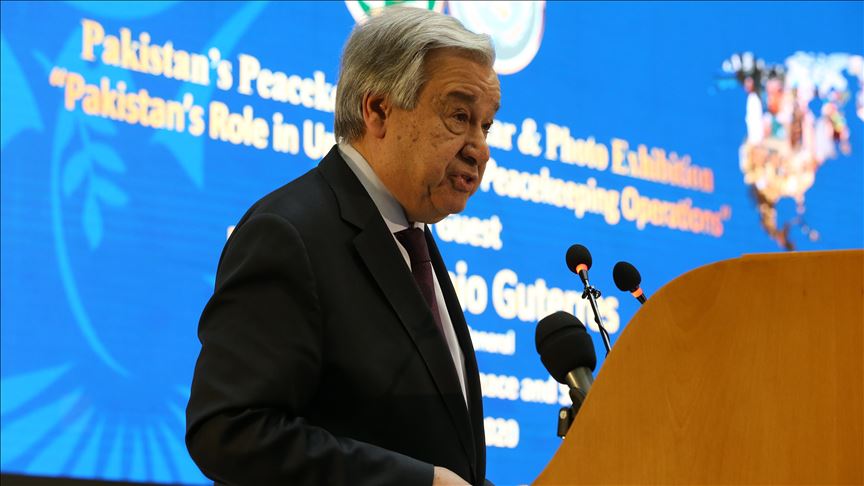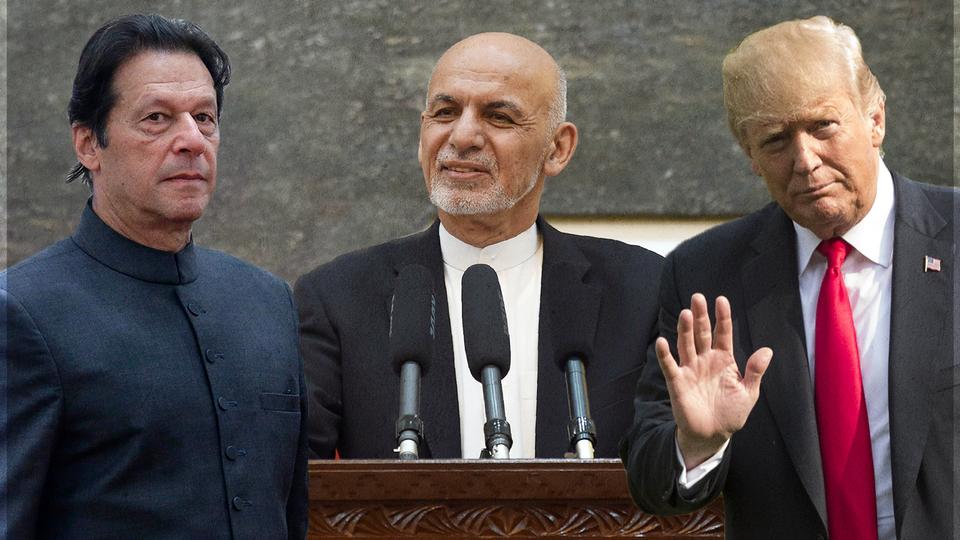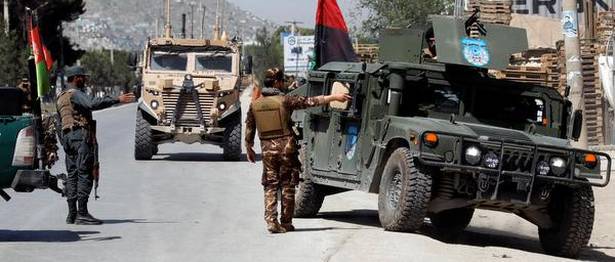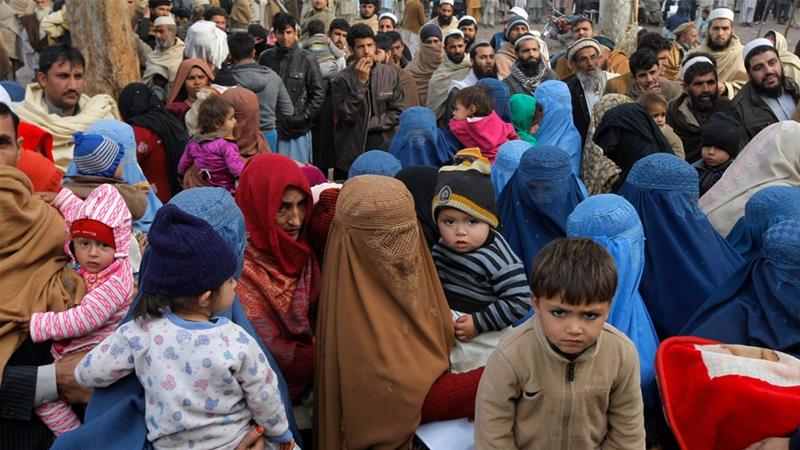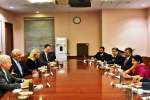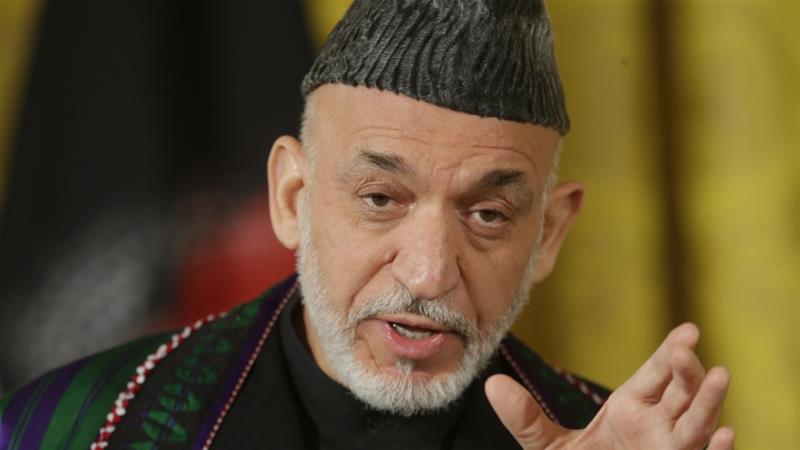UN chief says 'enormous' opportunity for development of Afghanistan, Pakistan, and Central Asia must not be missed
Publish dateTuesday 18 February 2020 - 00:31
Story Code : 203721
The UN secretary-general on Monday called for greater cooperation between Pakistan, Afghanistan, and the international community to “turn the region into a zone of prosperity”.
Antonio Guterres said increased collaboration between the key players can produce conditions that would automatically ensure the return of over 2.7 million Afghan refugees to their homeland.
“This has been the region of [the] great game, where the British and Russian empires competed. And where was the center of the competition; in Afghanistan,” Guterres said at a panel discussion during the ongoing refugee summit in Islamabad.
He said a “third method” -- a geo-economic strategic change -- could bring peace to the war-ravaged country.
“There is a chance of another game with foreign empires competing and countries of the region becoming victims again,” the UN chief said on the second of his four-day maiden visit to Pakistan.
“There is also a chance here to create a zone of prosperity and enormous opportunities of development for Central Asia, Afghanistan, and Pakistan. And this is an opportunity that cannot be missed.”
“It will facilitate the return of refugees because these opportunities will generate economic development, new corridors, new trade, and new industrial opportunities,” said Guterres.
Economic cooperation, he added, could put Central Asia, Afghanistan, and Pakistan in a position to capitalize on some “fantastic opportunities”.
“Central Asia is landlocked. What is their [Central Asian states] natural way to the sea; through Afghanistan and Pakistan,” said the top UN official.
A good legacy
Echoing his views, U.S. Special Envoy for Afghanistan Zalmay Khalilzad said Washington was not only partnering for peace in Afghanistan but its economic development as well.
“We want to reduce the burden. There's no question about that; 18 years is a long time,” he said, referring to the U.S.’ increased efforts to end the nearly two-decade long war in Afghanistan through a negotiated settlement with the Taliban.
“A lot of resources have been spent, and a number of lives have been lost, but we would like to leave a good legacy in Afghanistan in terms of peace and security,” the American diplomat said.
He added that Washington would continue supporting Afghanistan and be “very much engaged” in the region.
Khalilzad, who has visited Islamabad a record nine times in over a year to ensure Pakistan’s crucial support for the ongoing peace talks, said he was encouraged to see the Pak-Afghan leadership talking about regional connectivity and “moving beyond the blame game.”
He said bringing different Afghan factions to the table was a “huge challenge” and made the search for lasting peace even more complex.
The U.S. special envoy, however, expressed hope that the proposed peace deal between Washington and the Taliban would pave the way for an intra-Afghan dialogue.
Eyes on the future
Pakistan’s foreign minister stressed that Islamabad and Kabul had “no choice” but to work together for a solution to a range of simmering issues.
“My friend [Afghanistan’s foreign minister] is here. Does he have a choice? Do I have a choice? The only choice is to work together. We have to work in harmony; we have to understand [each other] and collectively move forward,” Shah Mahmood Qureshi said.
“Yes, we can [continue to] point fingers at each other but that will take us nowhere,” he said in reference to Pakistan and Afghanistan’s longstanding suspicions towards each other.
“But, I think, the time has come when the people of Afghanistan deserve peace, stability, and a bright future,” he said, extending assurances to all parties that Islamabad was ready to sincerely assist Kabul’s quest for peace.
“Pakistan is ready to engage with you [Afghanistan]. We do not want to look into the past -- our eyes are set on the future.”
Mohammad Haroon, Afghanistan’s acting foreign minister, supported the idea of regional cooperation to end conflicts.
“The only solution to all the crises … is regional cooperation and economic cooperation. I am optimistic that with the environment that has been created, these words will turn into actions, and we [will] see a positive change in this region,” he said.
Haroon asserted that Kabul understood the importance of increased collaboration and wants to be a “responsible partner” in efforts to boost regional connectivity.
Antonio Guterres said increased collaboration between the key players can produce conditions that would automatically ensure the return of over 2.7 million Afghan refugees to their homeland.
“This has been the region of [the] great game, where the British and Russian empires competed. And where was the center of the competition; in Afghanistan,” Guterres said at a panel discussion during the ongoing refugee summit in Islamabad.
He said a “third method” -- a geo-economic strategic change -- could bring peace to the war-ravaged country.
“There is a chance of another game with foreign empires competing and countries of the region becoming victims again,” the UN chief said on the second of his four-day maiden visit to Pakistan.
“There is also a chance here to create a zone of prosperity and enormous opportunities of development for Central Asia, Afghanistan, and Pakistan. And this is an opportunity that cannot be missed.”
“It will facilitate the return of refugees because these opportunities will generate economic development, new corridors, new trade, and new industrial opportunities,” said Guterres.
Economic cooperation, he added, could put Central Asia, Afghanistan, and Pakistan in a position to capitalize on some “fantastic opportunities”.
“Central Asia is landlocked. What is their [Central Asian states] natural way to the sea; through Afghanistan and Pakistan,” said the top UN official.
A good legacy
Echoing his views, U.S. Special Envoy for Afghanistan Zalmay Khalilzad said Washington was not only partnering for peace in Afghanistan but its economic development as well.
“We want to reduce the burden. There's no question about that; 18 years is a long time,” he said, referring to the U.S.’ increased efforts to end the nearly two-decade long war in Afghanistan through a negotiated settlement with the Taliban.
“A lot of resources have been spent, and a number of lives have been lost, but we would like to leave a good legacy in Afghanistan in terms of peace and security,” the American diplomat said.
He added that Washington would continue supporting Afghanistan and be “very much engaged” in the region.
Khalilzad, who has visited Islamabad a record nine times in over a year to ensure Pakistan’s crucial support for the ongoing peace talks, said he was encouraged to see the Pak-Afghan leadership talking about regional connectivity and “moving beyond the blame game.”
He said bringing different Afghan factions to the table was a “huge challenge” and made the search for lasting peace even more complex.
The U.S. special envoy, however, expressed hope that the proposed peace deal between Washington and the Taliban would pave the way for an intra-Afghan dialogue.
Eyes on the future
Pakistan’s foreign minister stressed that Islamabad and Kabul had “no choice” but to work together for a solution to a range of simmering issues.
“My friend [Afghanistan’s foreign minister] is here. Does he have a choice? Do I have a choice? The only choice is to work together. We have to work in harmony; we have to understand [each other] and collectively move forward,” Shah Mahmood Qureshi said.
“Yes, we can [continue to] point fingers at each other but that will take us nowhere,” he said in reference to Pakistan and Afghanistan’s longstanding suspicions towards each other.
“But, I think, the time has come when the people of Afghanistan deserve peace, stability, and a bright future,” he said, extending assurances to all parties that Islamabad was ready to sincerely assist Kabul’s quest for peace.
“Pakistan is ready to engage with you [Afghanistan]. We do not want to look into the past -- our eyes are set on the future.”
Mohammad Haroon, Afghanistan’s acting foreign minister, supported the idea of regional cooperation to end conflicts.
“The only solution to all the crises … is regional cooperation and economic cooperation. I am optimistic that with the environment that has been created, these words will turn into actions, and we [will] see a positive change in this region,” he said.
Haroon asserted that Kabul understood the importance of increased collaboration and wants to be a “responsible partner” in efforts to boost regional connectivity.
avapress.net/vdcewx8wzjh87fi.1kbj.html
Tags
Top hits
